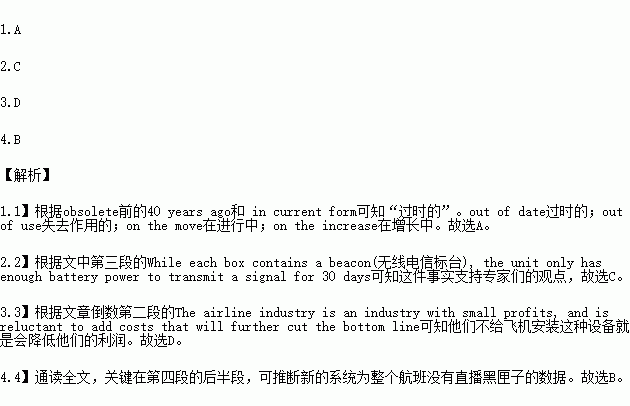题目内容
International teams have spent nearly half a year looking for evidence of the missing Malaysian Airlines plane, a search that includes the hunt for the aircraft’s so-called black box, which holds flight data that would likely explain what caused MH370 to move away from its course. But many aviation experts wonder why, in our increasingly networked world, divers are searching the Indian Ocean for a metal box when technology already exists that would enable planes to stream black box data to the ground in the event of an emergency.
Black boxes have been on planes since the late 1950s, and now every commercial aircraft has two: a flight data recorder and a voice recorder. (Although they are referred to as black boxes, they are typically orange in color, making them easier to spot in waters.) Black box recorders are mainly used to investigate the cause of in-flight accidents.
While black boxes are built to survive a crash and long-term submersion(浸没)in water, it can be a real challenge to find the device if a plane has gone down in the ocean. While each box contains a beacon(无线电信标台), the unit only has enough battery power to transmit a signal for 30 days. After the crash of Air France Flight 447 in the Atlantic Ocean in June 2009, it took divers two years to find the black box.
Pierre Jeanniot, a Canadian engineer who helped perfect black box technology about 40 years ago, feels that the device, in its current form, is “obsolete”. He started to question its effectiveness more than a decade ago, after seeing the broken pieces of the black boxes in the 2001 attacks on the World Trade towers in New York. Jeanniot is now on the advisory board of a Toronto-based firm that has built a live-streamed black box system. When a plane experiences an irregular event, the system can send streaming data off the aircraft to one of the satellites and then down to ground-based servers, where the message is interpreted and sent to the airline. It seems necessary that the loss of MH370 and other similar cases wake more people up to the fact that the tools being used at this stage are inadequate for dealing with emergency situations, Jeanniot says. He also estimates that if this technology had been on board the missing Malaysian Airlines flight and live-streaming for the estimated seven hours after the flight first experienced a problem, it would have cost about $3,000.
While there is widespread approval of a live-streamed black box system, most airlines see its cost prohibitive. The airline industry is an industry with small profits, and is reluctant to add costs that will further cut the bottom line.
However, given how much time, money and effort has been spent on the luckless search for MH370, s black box, the cost of operating a live-streaming version seems like a trifle(区区小数)
1.In this passage, the underlined word “obsolete” probably means .
A. out of date B. out of use
C. on the move D. on the increase
2.Which fact is mentioned to support aviation experts’ doubt about the effectiveness of the black box?
A. MH370’s black box holds flight data that might explain what happened to the aircraft.
B. The recorders are actually orange in color though referred to as black boxes.
C. The beacon in the black box has limited battery power to send out a signal for 30 days.
D. It’s necessary for people to wake up to the weaknesses of the black box
3.What’s airlines’ attitude towards the live-streamed black box system?
A. They approve of the system since it may save time, money and effort.
B. They consider using the system as the bottom line of costs.
C. They are reluctant to start the system because it still needs improving.
D. They are unwilling to equip planes with the system as it cuts their profits.
4.From the passage, we can learn that__________.
A. it takes divers one or two years to find the black box after a crash
B. the new system does not live stream black box data for the whole flight
C. Jeanniot changed his view on black box technology when working for a Canadian firm
D. operating a live-streamed black box system costs only three thousand dollars

